Introduction
The Gryphon Gear Aries 20 Quilt (25.7 oz / 729 g, MSRP from $327) is a three-season quilt with a differential cut, draft collar, an edge tensioning system, and 17.5 oz (496 g) of down fill. Its price puts it a little under the cost of similarly rated Nunatak and Katabatic quilts – its closest competitors. It is the warmest 20 °F quilt I’ve ever used.
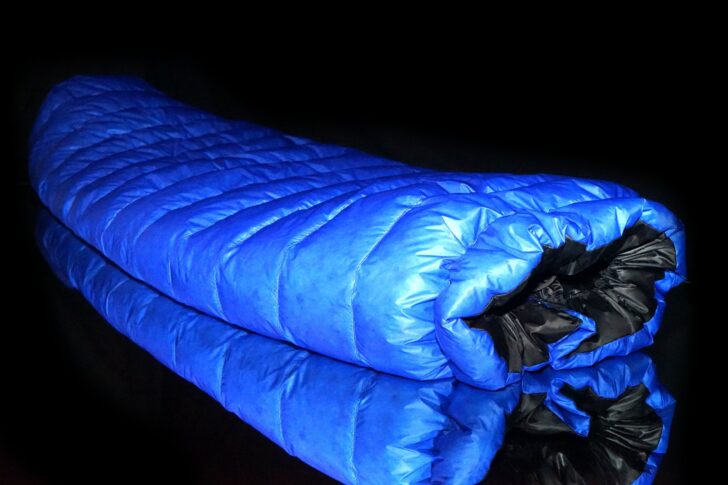
Highlights
efficient yet comfortable fit
- differential cut
- optional edge tensioning system
- extremely conservative rating
- way more down than most 20 °F bags
- less expensive than most other premium quilts
Review Rating: Recommended
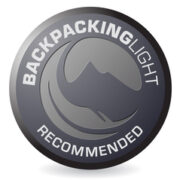
The Gryphon Gear Aries 20 Quilt is a three-season quilt with far more down in it than other similarly rated 20 °F quilts. It has all the same features as other premium quilts such as a draft collar, edge tensioning system, and differential cut but costs a little bit less than some of these other quilts. I could see having this quilt as my only quilt because it can easily do everything. I have successfully pushed into winter, but I anticipate that it will be a little too warm for alpine summer trips. As a part of a quiver, I could be reaching for this quilt in colder temps and using something lighter in the summer.
The only reason this quilt gets a Recommended rather than Highly Recommended rating is that I prefer the draft collar to be on the inside rather than the outside of the quilt. The other minor changes that would boost the rating to Highly Recommended include making the pad attachment strap adjustable on both sides and offering ripstop outer shell fabrics as options for those that want more durability. All that said, the Gryphon Gear Aries 20 Quilt gets a Recommended Rating because it is close to being the perfect shoulder season quilt for use in my primary shoulder season backpacking destinations, in the high deserts of southern Utah and northern Arizona where temperatures could range from 10 to 40 °F (−12 to 4 °C).
Where to Buy
- The Gryphon Gear Aries 20 Quilt can be purchased directly from Gryphon Gear or Garage Grown Gear.
Review Context
For a few seasons, I used a Western Mountaineering Megalite, draping it over me like a quilt, often wondering why I was using a bag with a zipper. I sold it and purchased a Katabatic Gear Alsek 22 in 2015. I used the Alsek for several seasons and found it to be pretty close to perfect with one exception – it felt a little tight in the legs. My Alsek had a shoulder girth of 52 in (132 cm) and a 38 in (97 cm) footbox. In early 2019 I picked up a Nunatak Arc UL 20 for its roomier fit. The comfort of Nunatak is exceptional, but I ordered it too large. The shoulder girth is 58 in (147 cm) and the footbox is 40 in (102 cm), meaning the cut is less efficient than the Katabatic and this has been somewhat of an issue for me in colder temps. Arc UL quilts are also generally egg-shaped (widest closed girth in the middle), whereas Katabatic quilts are mummy-shaped (widest closed girth in the shoulder area).
Other quilts I’ve used include the Warbonnet Diamondback 0 and the REI Magma Trail Quilt 30. The Trail Quilt has a larger (and thus less-efficient) footbox than most ultralight tapered (mummy-shaped) quilts. Both the Diamondback and the Magma Trail Quilt have less secure pad attachment systems than, for example, the Katabatic quilts. Ryan Jordan reviewed the REI Magma 30 Trail Quilt in 2019 and liked both of these attributes (footbox size and pad attachment system) more than me, giving it a Recommended Rating.
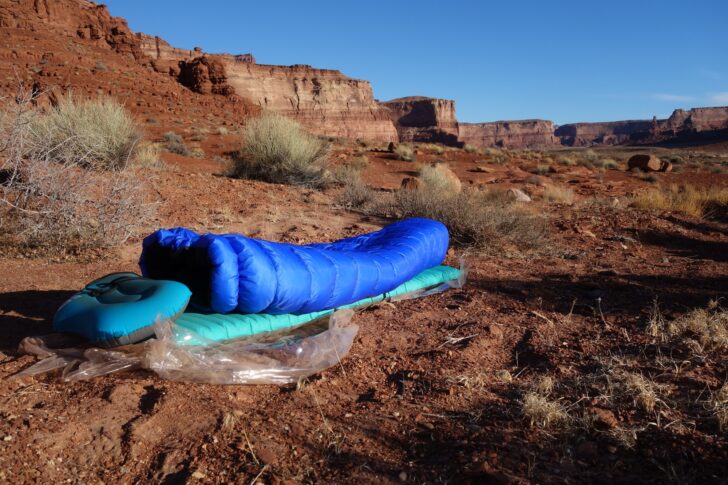
To split the width difference between the Katabatic and the Nunatak I got the Gryphon Gear Aries 20 Quilt with a shoulder girth of 54 in (137 cm) and a footbox of 36 in (91 cm). Size-wise the width and length are perfect for me, being 5 ft 11 in (180 cm) tall and weighing 160 lbs (73 kg). The Aries has a shape somewhere in-between the Katabatic and the Nunatak; it’s more like a blunt-tipped triangle with straight lines running from shoulder to foot.
The Aries 20 was also compelling because it is about the same weight as the 15 °F (−9 °C) rated Katabatic Gear Sawatch quilt, but has 1.5 oz (43 g) more down in it and costs $55 less. Intrigued by these specs and this promise of good value, I decided to try it out.
This review is comprehensive in nature and is classified as a Performance Review (more info). It draws on my experience using the quilt for 14 nights from the beginning of February to the end of April 2021. I used the quilt in southern Utah, northern and central Arizona, and the in the Wasatch Mountains of northern Utah. Temperatures ranged from about 14 °F (−10 °C) to about 45 °F (7 °C). Most nights had very low humidity except for one extremely humid night in the Mazatzal Wilderness. I’ve spent about an equal number of nights inside of shelters vs. cowboy camping (no shelter).
Features
- adjustable, insulated draft tube at collar
- trapezoidal foot box (permanently enclosed)
- horizontal baffle orientation
- box baffles
- differential cut
- pad fastening webbing and clips
- edge tensioning system
- Made in Michigan, U.S.
Specifications
All specifications are for size regular (length 54 in / 137 cm)
- claimed weight: 25.7 oz (729 g)
- measured weight of quilt + pad attachment straps: 25.7 oz (729 g)
- temperature rating: 20 °F (−7 °C)
- fill type: 900-fill-power grey goose down
- fill weight: 17.5 oz (496 g)
- dimensions: 72 x 54 in (183 cm x 137 cm)
- compressed dimensions: 13 x 4.75 in (33 x 12 cm)
- shell fabric: 10D Nylon with DWR
- lining fabric: 10D Nylon with DWR
- collar girth: 53 in (135 cm)
- shoulders: 54 in (137 cm)
- shoulders (actual measurements): 54 in (137 cm)
- hips: 51 in (130 cm)
- foot box: 36 in (91 cm)
Product Category Overview
The “20 °F” quilt category may seem like a flooded market, but there are relatively few quilts made with “premium materials” that are comfortable, efficient, and (relatively) inexpensive.
To my mind, the quilt market can be broken into two groups: quilts with differential cut, and quilts without (we explain differential cuts below). The Gryphon Gear quilts are in the former category with other premium quilts such as those made by Katabatic Gear and Nunatak Gear. Quilts made by Enlightened Equipment and Hammock Gear are examples of the latter category. Read on to find out why the Gryphon Gear Aries is an intriguing addition to the premium quilt category.
Design/Technology Overview
Three-season quilts range in price from about $250 to around $500. The expected differences between budget and high-end quilts are the quality of the materials; 800 fill for a budget quilt and 950+ fill for a high-end quilt, for example. But something else that differentiates these quilts is differential cut.
The other thing that sets the Gryphon Gear quilts apart from others is their promise of “80% overfill.” I will do my best to explain both of these concepts below.
Differential Cut Technology
Like quilts from Katabatic Gear and Nunatak, The Gryphon Gear Aries 20 Quilt uses a differential cut, meaning the inner fabric is cut smaller than the outer fabric. This feature allows the quilt to loft fully even when an elbow, knee, or hip is pushing into the fabric toward the cold air outside. Manufacturing a quilt with a differential cut is more time-consuming, meaning it’s also more costly. The fact that Gryphon Gear implements this technology without charging a whole lot for it is worth noting.
- More: Backpacking Light Members discuss the utility of differential cut in this forum thread.
Fabric Technology
The shell material on the Gryphon Gear Aries 20 Quilt is a 10 denier, DWR (durable water repellent) coated Nylon. It does not appear to be a ripstop fabric which is somewhat concerning. Ripstop fabrics have a grid of strong threads woven throughout in order to prevent small snags from becoming large tears. I have not ripped the shell of my quilt so I can’t say if the fabric will produce long tears easily with its lack of ripstop. The same material (black) is used for the liner and has a soft, comfortable feel. I do have one tiny hole of unknown origin in the liner.
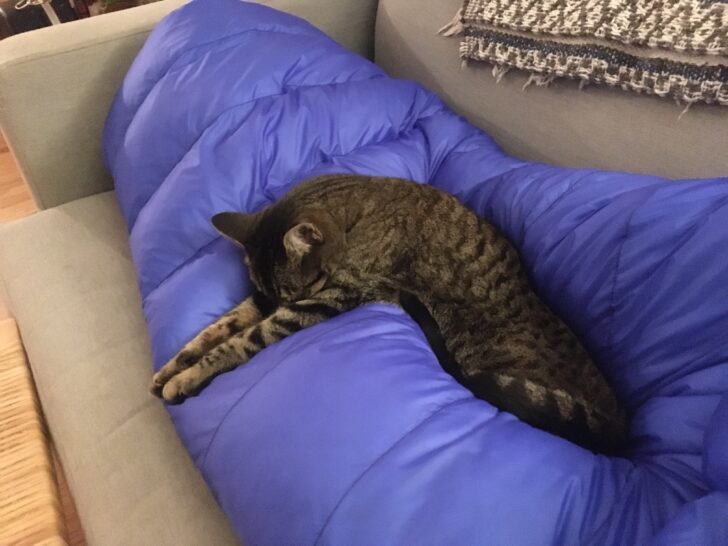
Insulation Technology
Gryphon Gear quilts use 900 fill power HyperDry water-resistant RDS (Responsible Down Standard) certified goose down. There are differing opinions on how effective water-resistant down actually is. I would probably have chosen untreated down if the option was available simply because many leading brands are still not using water-resistant down because down treatments are suspected to reduce fill power.
- More: check out this forum thread where BPL members discuss water-resistant down.
Overfill
The Gryphon Aries seems to contain more overfill than many other manufacturers use. If you have a down chamber that is 900 cubic inches and you fill it with 1 oz (28 g) of 900-fill power down, you will achieve full loft within that chamber. If you fill it with 2 oz (57 g) of the same down, you will achieve 100% overfill. The baffles of the Gryphon Aries are overfilled by 80%. This is a pretty aggressive rate of overfill that offers the following benefits:
- More down in the baffle chamber results in maximum thickness (loft).
- Higher down density in the baffle chamber resists the shifting of down clumps and creating cold spots.
- More down provides some insurance against the loss of loft due in response to moisture accumulation.
Of course, the disadvantage of this much overfill is that for the loft that this quilt has, it’s going to be a little heavier than similarly-thick quilts from other manufacturers.
It’s a bit hard to say if Katabatic or Nunatak, for example, are using more or less down per chamber than Gryphon Gear, because most manufacturers do not report the overfill percentage as a product spec. This, combined with baffle height and measured loft, would be valuable information that could be used when comparing bags from different manufacturers.

Performance Assessment
Description of Field Testing

Locations
- I tested the Gryphon Gear Aries 20 Quilt in my backyard in Salt Lake City in February just so I knew what I was getting myself into before going out in the field. In my backyard testing the temperatures ranged from about 27 to 38 °F (−3 °C to 3 °C).
- Also in February, I used it for five nights in the desert of southern Utah where I cowboy camped every night in similar temperatures.
- In early March I spent a 14 °F (−10 °C) night in the Wasatch in a four-season tent and slept in this quilt. That night I used a 50 °F-rated synthetic overquilt over the Aries.
- There were a handful of other nights spent both in shelters and not in shelters throughout the Colorado Plateau.

Dates & Seasons
- I used the Gryphon Gear Aries 20 Quilt throughout the winter and spring of 2021, from about February 1st to April 12th.
Environmental Conditions
- I’ve used the Gryphon Gear Aries 20 Quilt in temperatures ranging from about 14 °F (−10 °C) to about 45 °F (7 °C). Most nights had very low humidity except for one extremely humid night in the Mazatzal Wilderness where the DWR coating repelled the condensation just fine. I’ve spent about the same number of nights inside of shelters vs. cowboy camping (no shelter).
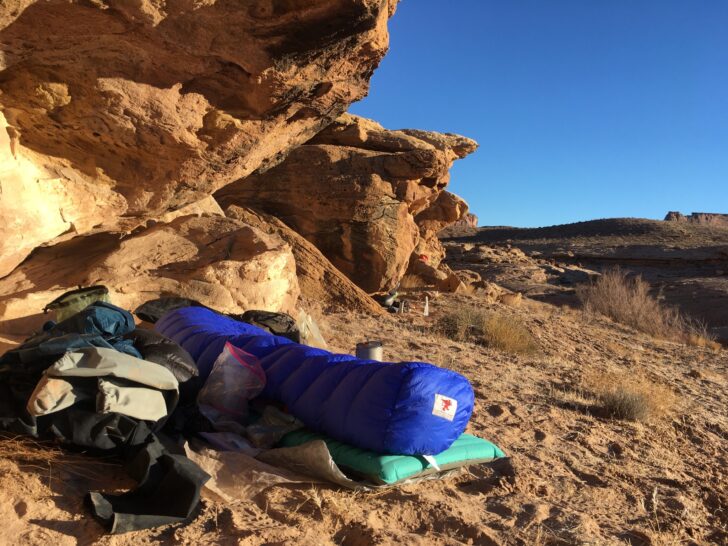
How Many User-Days?
- I used the Gryphon Gear Aries 20 Quilt for 14 nights.
Use Case Scenarios
- I will reach for the Gryphon Gear Aries 20 Quilt any time I know the temperature is going to be 20 to 30 °F (-7 to -1 °C). Within this range, I am certain I will be warm enough.
- I have yet to use the Aries 20 in the summer in alpine regions, but I could see it being very pleasant to drape over me without attaching to the pad in warmer temperatures.
- If a trip is going to be above freezing, I could see reaching for a 30 °F-rated quilt or bag instead. That said, it seems quite likely that I could get away with the Aries 20 as my only bag; I do think I could use it in every season.
List of Performance Criteria
The general questions I hope to answer using these criteria are:
- How warm is this quilt for the weight and how do various features contribute to that warmth?
- How comfortable is it and how do various features contribute to that comfort?
- How long will it last?
- Is there anything unique about this product?
I hope the following criteria will help the user differentiate between this quilt and other similar quilts.
- durability
- warmth
- edge tensioning system
- fit and comfort
- draft collar
- pad attachment
- usability
- weight
- finish quality
Durability
Member Exclusive
A Premium or Unlimited Membership* is required to view the rest of this article.
* A Basic Membership is required to view Member Q&A events

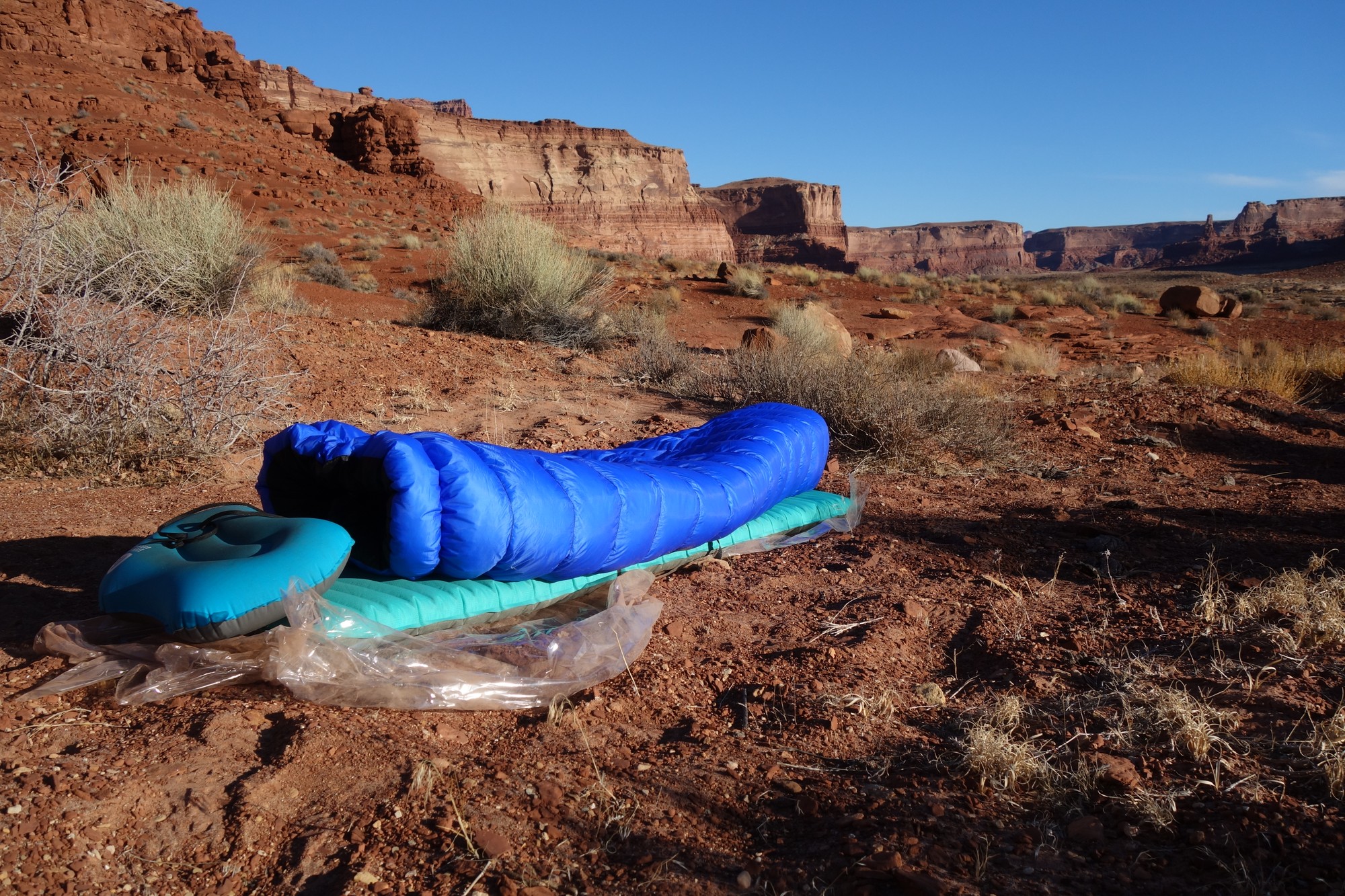


Home › Forums › Gryphon Gear Aries 20 Quilt Review